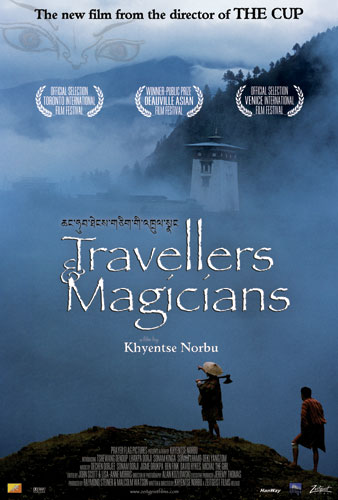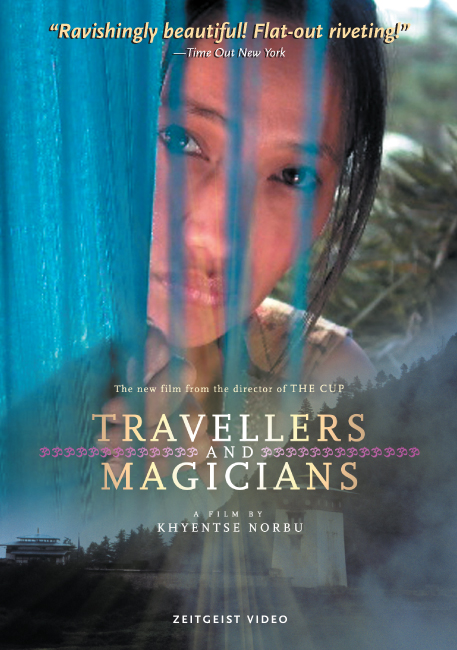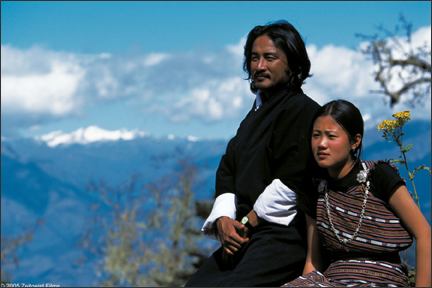Travellers & Magiciens
Såvidt vi vet er dette første gangen denne filmen blir vist i Norge - Oslo Spirituelle Filmklubb har fått spesiell tillatelse til å vise filmen gjennom David Hykes. Etter filmvisningen vil David Hykes, som har laget musikken til filmen, snakke om musikk, bevissthet og harmonisk tilstedeværelse.
David Hykes - www.harmonicworld.com/
Om Filmen:
Travellers and Magicians (Original title: Dzongkha: Chang Hup Thengi Thruel Nang) is a 2003 Bhutanese Dzongkha language film written and directed by Khyentse Norbu, a reincarnate lama of Tibetan Buddhism, who is also known as Dzongsar Jamyang Khyentse Rinpoche. The movie is the first feature film shot entirely in the kingdom of Bhutan. The majority of the cast are not professional actors; Dendup, a well-known Bhutanese radio actor and producer, is the exception. The movie breaks ground as the first to take a Himalayan Buddhist perspective, offering a unique insight into this culture from the inside.
Tagline: The bitter and the sweet of temporary things.
A young government official named Dondup (played by Tshewang Dendup) who is smitten with America (he even has a denim gho) dreams of escaping there while stuck in a ravishingly beautiful but isolated village. He hopes to connect in the US with a visa out of the country. He misses the one bus out of town to Thimphu, however, and is forced to hitchhike and walk along the lonely Lateral Road to the west, accompanied by an elderly apple seller, a perceptive buddhist monk with his ornate, dragon-headed dramyin heading to Thimphu for the Thimphu tsechu, a drunk, a widowed rice paper maker and his beautiful daughter Sonam (played by Sonam Lham).
Throughout the journey, the perceptive yet mischievous monk tells the tale of Tashi, a restless farmboy who like Dondup dreams of escaping village life. In the tale Tashi escapes, but immediately becomes lost in remote mountains and finds his life entwined with that of a menacing hermit woodcutter and his beautiful young wife. It is a mystical fable of lust, jealousy and murder, that holds up a mirror to the restless Dondup, and his blossoming attraction to the innocent Sonam. The cataclysmic conclusion of the monk's tale leaves Dondup with a dilemma -- is the grass truly greener on the other side? Dondup is faced with a choice of escaping or staying when he finally manages to hitch a ride into Thimphu.
According to the director, the story of Dendup was inspired by Izu No Odoriko (The Dancing Girl of Izu), a story by Yasunari Kawabata about a group of travellers and an infatuation between a dancing girl and a schoolboy. The story of Tashi was inspired by a Buddhist fable about two brothers, one of whom aspires to become a magician.
In making this film, Dzongsar Jamyang Khyentse Rinpoche, an internationally-renowned Buddhist lama, sets the standard for the nascent Bhutanese film industry. The film depicts traditional Bhutanese folklore, and storytelling techniques. Travellers and Magicians is a profoundly Bhutanese film, with a theme and vocabulary that reflects the culture of Bhutan.
The storytelling technique employed in the film is the one of a story within a story, as the monk narrates the story of Tashi within the film. The nesting of worlds go three levels deep, as Tashi hallucinates/dreams after consuming chhang. Traditional, as well as fusion music is used in the movie, with Western rock and Western-influenced music being heard via Dondup's music system, and traditional music from the dramyin of the monk and as ambient music.
Buddhist Themes
The structure and subgenres of the film provide a nice framework for two major, intertwined themes, both of them very Buddhist in nature. The subtler theme, most rooted in it being a road movie, is that of living in the moment, which is one aspect of mindfulness. The journey, here shown in a literal way, but also meant figuratively, is just as important as arriving at a destination. The more explicit theme, rooted in the grass-is-greener aspect, is a warning against the attachment to hopes, desires and dreams. Attachment is different than merely having hopes, desires and dreams. Attachment is a state where one stops being mindful of the here and now.
Dondup keeps dreaming about America. In his mind, he's already there, and his appearance and behavior evidence this. He talks of how beautiful it must be, yet Bhutan, which is on the edge of South-Central China, in the Himalayas, not too far from Mount Everest and Nepal, isn't short on beauty. Exquisite cinematography keeps us aware of this, and stresses how Dondup cannot see what is right in front of his face. He also dreams of the job he might hold in America--perhaps he'll be an apple-picker or dishwasher, he muses. But he has a relatively well-paid and certainly well-respected position in his culture. He dreams of the women in America, yet he runs into a very beautiful and elegant woman on his journey who is young, single and very attracted to him. The grass-is-greener theme even rears its head by Dondup trying to block out live music that's right in front of him (thanks to the Monk with a dramnyen, which is a bit like a guitar) by playing western music on a boom box.
At the same time, the parallel story told by the monk features a young man with similar dreams who inadvertently escapes to an unknown area where he too meets a beautiful woman who is attracted to him. The woman's husband has also achieved "the other side of the fence" in his grass-is-greener dream, but with the arrival of the young man, it backfires on him. Achieving the greener grass also ends up backfiring on the young man in a way, and he seeks a return home.
It's important to remember that in Buddhism, these ideas are not presented in moralizing way, and they're not presented as something black and white. Hopes, desires and dreams are not considered bad things (and neither is attachment--the problems with such things are more matter-of-factly presented), and certainly, the grass could be greener somewhere else. Because of this, Travellers and Magicians writer/director Khyentse Norbu maintains appropriate degrees of ambiguity throughout the film. While doing so, he presents a story with important themes that is captivatingly told with beautiful cinematography and excellent performances.




